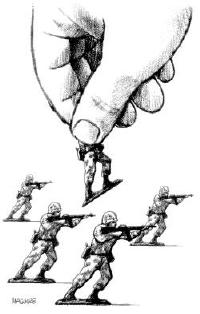|
Issue Date: October 10, 2003
Students learn of 'real world' conflicts via Tootsie Rolls By MICHAEL J. DALEY with MATTHEW KEMPER Recently, my colleague Matt Kemper was asked to speak to a group of junior high school students on the notion of justice. Enlisting the help of a colleague, they made their pitch to 26 students who were visiting his suburban Jesuit high school from their local urban elementary schools. They decided that in order to illustrate the abstract notion of justice in a concrete manner, they would try what they initially thought was a simple classroom game. They divided the students into three groups. Each cluster represented either a First, Second or Third World nation. The groups were designed to reflect symbolically the larger “real” world. The group with the most students was the Third World group, whereas only two students represented the First World. Each student was then given pieces of Tootsie Roll candy proportional to their nation’s consumption of world resources. The students representing the First World were permitted to take as much candy as they could hold, the Second World group received a handful of candy and those in the Third World group were given only a piece of candy each. Then it started. One by one, the students in the Third World group vehemently objected to their tiny ration of candy. ”What? This is all we get?” exclaimed one boy. ”This isn’t fair!” retorted another. Soon their protests shifted from complaints to aggression: “Let’s attack the First World!” “Yeah, let’s go to war with them!” “Let’s fight them and take their candy; they can’t eat all of it themselves!” For their part, the First World group defended their position and prepared for a counterattack. A cold, eerie sensation enveloped the room as Matt and his colleague stood back and watched this activity unfold. They could not help but think to themselves that the students’ response to this simulation game mirrored actual current events. The students adopted roles quite similar to those of America, North Korea, Iraq and Israel. Granted, this outcome was not at all what they had anticipated. Matt stopped the shouting and asked the students to gather their chairs in a semicircle for discussion. He pointed out to them what he had heard. “Hey guys, do you realize what just happened here? Here we just finished a war with Iraq and how do you want to solve your Tootsie Roll problem? By going to war!” Coincidence? We don’t think so. In light of these classroom events, our minds went immediately to Walter Wink’s book The Powers That Be. There, he describes one of America’s original sins -- the myth of redemptive violence. This myth “enshrines the belief that violence saves, that war brings peace, that might makes right.” As evidenced in his “Take no prisoners! Wanted: dead or alive!” language, this seems to be President Bush’s operative myth as well. Had Bush been in the classroom with Matt, he would have witnessed firsthand how destructive and limiting this way of thinking can be. As Pope John Paul II has declared, however righteous America’s intentions may be, there must be alternatives other than war, for responding with violence only begets more violence, more war, more death. A Sufi story recounted in The Good You Do Returns: A Book of Wisdom Stories by J.P. Vaswani illustrates this well. One day, while the master bathed in the river, he was bitten on the foot by a crocodile. With blood flowing from his heel, he made it back to the riverbank. At this point, in deep pain from his bite, he voiced the word of praise, “Shukur! Shukur!” The disciple who was with him all the while responded in utter amazement, “How can you be bitten by a crocodile and still say, ‘Shukur’? What do you have to be thankful for?” The master calmly replied, “I am blessed because I fell into the mouth of a crocodile. I did not fall into sin.” Whether tempted in the desert by the devil, provoked throughout his public ministry by the Pharisees and Sadducees or confronted by the violence of the soldiers intent on arresting him, Jesus chose another way: “Put your sword back into your sheath, for all who take the sword shall perish by the sword.” Similarly, in light of the nightmare of atomic weapons, the great physicist Albert Einstein echoed the words of Jesus when he said, “No problem can be solved from the same consciousness that created it. We must learn to see the world anew.” Though it sounds trite, superficial and simplistic, Jesus offers us the way to break the cycle of violence: love. As he demonstrated through his life, death and resurrection, one doesn’t uproot hate with more hate, revenge with more revenge. One does it with love. Our children are listening. What model will we give them? Can we break the present one? Matthew Kemper and Michael J. Daley are teachers at St. Xavier High School in Cincinnati, Ohio. National Catholic Reporter, October 10, 2003 |
 Candy ain't dandy in this classroom
Candy ain't dandy in this classroom